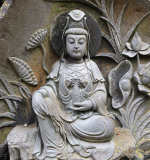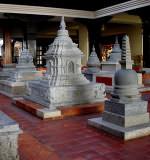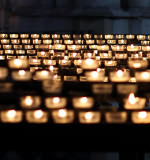| Download and install the indispensable font(s) to view Sanskrit in its full glory Read Transliterating (2) (English) to fully understand the transliteration system |
Parabhairavayogasamayāḥ - Rules in Parabhairavayoga
A compendium of rules for initiates
Introduction
As the number of initiates accumulate, I decided to compile all the rules Abhinavagupta wrote and quoted in the chapter 15 of his Tantrāloka. I will be quoting many (not all, I guess) of those rules then. I will add some other rules in order to fully adapt this set of observances strictly to the Parabhairavayoga environment. What is Parabhairavayoga? I created Parabhairavayoga as a Yoga exclusively oriented toward Liberation. It is heavily based on Trika Shaivism but it contains things of my own spiritual lineage too. Although Trika Shaivism is basically an aggregate of four schools: Spanda, Pratyabhijñā, Kula and Krama, in Parabhairavayoga Spanda and Pratyabhijñā have predominance. Though some rituales are necessary, Parabhairavayoga does not rest on the whole set of rituals stipulated in Kula, for example. And there is no worship of any goddesses. Our only deity is Śiva (Bhairava) to Whom we owe our own existence.
I wrote this in very simple Sanskrit any beginner in the sacred language could follow with no problems. I also provide you with a detailed word-for-word translation so the meaning of my teaching is very clear. May our Glorious Parabhairava reside always in His sacred teachings!
Keeping the above in mind, now read Parabhairavayogasamayāḥ and experience Supreme Delight, dear Śiva.
Important: All that is in brackets and italicized within the translation has been added by me in order to complete the sense of a particular phrase or sentence. In turn, all that is between double hyphen (--...--) constitutes clarifying further information also added by me.
Parabhairavayogasamayāḥ (Rules in Parabhairavayoga)
अथ मोक्षाय परभैरवयोगसमयाः परभैरवयोगे सर्वदीक्षितानुष्ठितसमस्तसमयसङ्ग्रहाः श्रीमद्गब्रिएल्प्रदीपकेन विरचिताः॥१॥
Atha mokṣāya parabhairavayogasamayāḥ parabhairavayoge sarvadīkṣitānuṣṭhitasamastasamayasaṅgrahāḥ śrīmadgabrielpradīpakena viracitāḥ||1||
Here begins (atha), for (the attainment of) Liberation (mokṣāya), "Rules in Parabhairavayoga" (parabhairavayoga-samayāḥ), a compendium of all the rules to be followed by all those who were initiated (sarva-dīkṣita-anuṣṭhita-samasta-samaya-saṅgrahāḥ) into Parabhairavayoga (parabhairavayoge), which were written (viracitāḥ) by illustrious Gabriel Pradīpaka (vareṇya-gabriel-pradīpakena)||1||
यतो दीक्षितानां सङ्ख्या सञ्चिततां गता ततस्तस्य श्रीतन्त्रालोके पञ्चदशाह्निकेऽभिनवगुप्तपादैर्लिखितानामुद्धृतानां च केषाञ्चित्समयानां सङ्कलनं कर्तुमहं निश्चितवान्॥२॥
Yato dīkṣitānāṁ saṅkhyā sañcitatāṁ gatā tatastasya śrītantrāloke pañcadaśāhnike'bhinavaguptapādairlikhitānāmuddhṛtānāṁ ca keṣāñcitsamayānāṁ saṅkalanaṁ kartumahaṁ niścitavān||2||
Since (yatas) the number (saṅkhyā) of initiates (dīkṣitānām) accumulates (sañcitatām gatā), therefore (tatas), I decided (aham niścitavān) to make (kartum) a compilation (saṅkalanam) of some samaya-s or rules (keṣāñcid samayānām) written (likhitānām) and (ca) quoted (uddhṛtānām) by eminent Abhinavagupta (abhinavagupta-pādaiḥ) in the fifteenth chapter (pañcadaśa-āhnike) of his venerable Tantrāloka (tasya śrī-tantrāloke)||2||
मया पुनः समाक्षेप्याः समया अन्येऽपि परभैरवयोगविषयाशेषविधिसमूहयोग्यतासिद्ध्यर्थम्॥३॥
Mayā punaḥ samākṣepyāḥ samayā anye'pi parabhairavayogaviṣayāśeṣavidhisamūhayogyatāsiddhyartham||3||
However (punar), I will also add other rules (mayā... samākṣepyāḥ samayāḥ anye api) in order to attain compatibility between the whole group of observances and the environment of Parabhairavayoga (parabhairavayoga-viṣaya-aśeṣa-vidhi-samūha-yogyatā-siddhyartham)||3||
अवादोऽकरणं गूढिः पूजा भावना हननं मोहनं चेति मुख्यसमयसप्तकम्॥४॥
Avādo'karaṇaṁ gūḍhiḥ pūjā bhāvanā hananaṁ mohanaṁ ceti mukhyasamayasaptakam||4||
(There is) a group of seven main rules (mukhya-samaya-saptakam): "(1) What is not to be said (avādaḥ), (2) what is not to be done (akaraṇam), (3) what is to be kept hidden (gūḍhiḥ), (4) worship (pūjā), (5) contemplation (bhāvanā), (6) the act of striking (hananam) and (ca) (7) the act of bewildering (mohanam... iti)"||4||
अवादः - यः परभैरवयोगे दीक्षितः स शिष्यो मन्त्रतन्त्राणां स्वभावमसत्प्रलापं परुषमनृतं न वदेत्॥५॥
Avādaḥ - Yaḥ parabhairavayoge dīkṣitaḥ sa śiṣyo mantratantrāṇāṁ svabhāvamasatpralāpaṁ paruṣamanṛtaṁ na vadet||5||
What is not to be said (avādaḥ): The disciple (saḥ śiṣyaḥ) who (yaḥ) has been initiated (dīkṣitaḥ) in Parabhairavayoga (parabhairavayoge) should not speak (na vadet) about the nature (svabhāvam) of Mantra and Tantra (mantra-tantrāṇām), (he should not be involved) in false chattering (asat-pralāpam), (he should not give himself over to) harsh and contumelious speech (paruṣam) (and he should not tell) lies (anṛtam)||5||
अकरणम् - यः परभैरवयोगे दीक्षितः स शिष्योऽफलं चेष्टितं हिंसां गर्वं दम्भं नचाचरेत्॥६॥
Akaraṇam - Yaḥ parabhairavayoge dīkṣitaḥ sa śiṣyo'phalaṁ ceṣṭitaṁ hiṁsāṁ garvaṁ dambhaṁ nacācaret||6||
What is not to be done (akaraṇam): The disciple (saḥ śiṣyaḥ) who (yaḥ) has been initiated (dīkṣitaḥ) in Parabhairavayoga (parabhairavayoge) should not do (na ca ācaret) (these things: He should not be involved in) fruitless (aphalam) behavior (ceṣṭitam) (and) in harming (hiṁsām), (and he should also abstain from) arrogance (garvam) (and) deceit (dambham)||6||
गूढिः - यः परभैरवयोगे दीक्षितः स शिष्यः स्वं मन्त्रमक्षसूत्रं च ज्ञानस्वरूपकं समाचारान्गुणान्क्लेशान्सिद्धिलिङ्गानि गूहयेत्॥७॥
Gūḍhiḥ - Yaḥ parabhairavayoge dīkṣitaḥ sa śiṣyaḥ svaṁ mantramakṣasūtraṁ ca jñānasvarūpakaṁ samācārānguṇānkleśānsiddhiliṅgāni gūhayet||7||
What is to be kept hidden (gūḍhiḥ): The disciple (saḥ śiṣyaḥ) who (yaḥ) has been initiated (dīkṣitaḥ) in Parabhairavayoga (parabhairavayoge) should hide (gūhayet) himself (svam), Mantra (mantram) and (ca) rosary (akṣasūtram), the nature of knowledge (jñāna-svarūpakam), the good qualities in (his) behavior (samācārān guṇān), afflictions (kleśān) (and) marks of accomplishment/success (siddhi-liṅgāni)||7||
पूजा - यः परभैरवयोगे दीक्षितः स शिष्यो गुरुं शास्त्रं देवं ज्ञानवृद्धान्गुरुवर्गं च यथाशक्त्या पूजयेत्॥८॥
Pūjā - Yaḥ parabhairavayoge dīkṣitaḥ sa śiṣyo guruṁ śāstraṁ devaṁ jñānavṛddhānguruvargaṁ ca yathāśaktyā pūjayet||8||
Worship (pūjā): The disciple (saḥ śiṣyaḥ) who (yaḥ) has been initiated (dīkṣitaḥ) in Parabhairavayoga (parabhairavayoge) should worship (pūjayet), to the utmost of his power (yathāśaktyā), Guru (gurum), scripture (śāstram), God (devam), those who are advanced/experienced in Knowledge (jñāna-vṛddhān) and (ca) Guru's group/family (guru-vargam)||8||
भावना - यः परभैरवयोगे दीक्षितः स शिष्यः शिवं शक्तिं तथात्मानं मुद्रां मन्त्रस्वरूपकं संसारभुक्तिमुक्तीश्च गुरुवक्त्रात्तु भावयेत्॥९॥
Bhāvanā - Yaḥ parabhairavayoge dīkṣitaḥ sa śiṣyaḥ śivaṁ śaktiṁ tathātmānaṁ mudrāṁ mantrasvarūpakaṁ saṁsārabhuktimuktīśca guruvaktrāttu bhāvayet||9||
Contemplation (bhāvanā) - The disciple (saḥ śiṣyaḥ) who (yaḥ) has been initiated (dīkṣitaḥ) in Parabhairavayoga (parabhairavayoge) should contemplate (bhāvayet) (these eight things) from the mouth of the Guru --i.e. such as his Guru has taught him-- (guru-vaktrāt tu): Śiva (śivam), Śakti (śaktim) as well as (tathā) the Self (ātmānam), the Seal (mudrām), the nature of the Mantra (mantra-svarūpakam) together with --lit. and-- (ca) Transmigration, Enjoyment and Liberation (saṁsāra-bhukti-muktīḥ)||9||
हननम् - यः परभैरवयोगे दीक्षितः स शिष्यो रागं द्वेषमसूयां च सङ्कोचेर्ष्याभिमानिताः समयप्रतिभेत्तॄंस्तदनाचारांश्च घातयेत्॥१०॥
Hananam - Yaḥ parabhairavayoge dīkṣitaḥ sa śiṣyo rāgaṁ dveṣamasūyāṁ ca saṅkocerṣyābhimānitāḥ samayapratibhettṝṁstadanācārāṁśca ghātayet||10||
The act of striking (hananam) - The disciple (saḥ śiṣyaḥ) who (yaḥ) has been initiated (dīkṣitaḥ) in Parabhairavayoga (parabhairavayoge) should strike --in the sense of "removing", obviously, though the literal meaning is "he should kill/destroy"-- (ghātayet) attachment (rāgam), hatred (dveṣam) and (ca) calumny/detraction (asūyām), fear, envy, self-conceit (saṅkoca-īrṣya-abhimānitāḥ), those who break the rules (samaya-pratibhettṝn) and (ca) those who do not observe them --i.e. who do not observe such rules-- (tad-anācārān)||10||
Passages 11 to 20
मोहनम् - यः परभैरवयोगे दीक्षितः स शिष्यः पशुमार्गस्थितान्क्रूरान्द्वेषिणः पिशुनाञ्जडान्पापिनो विघ्नकर्तॄंश्च मोहयेत्॥११॥
Mohanam - Yaḥ parabhairavayoge dīkṣitaḥ sa śiṣyaḥ paśumārgasthitānkrūrāndveṣiṇaḥ piśunāñjaḍānpāpino vighnakartṝṁśca mohayet||11||
The act of bewildering (mohanam) - The disciple (saḥ śiṣyaḥ) who (yaḥ) has been initiated (dīkṣitaḥ) in Parabhairavayoga (parabhairavayoge) should bewilder (mohayet) those who are on the path of the paśu-s --lit. beasts, i.e. people in bondage-- (paśu-mārga-sthitān), those who are cruel (krūrān), the haters (dveṣiṇaḥ), those who are treacherous (piśunān), the fools (jaḍān), the sinners (pāpinaḥ) and (ca) those who cause obstacles (vighna-kartṝn)||11||
यः परभैरवयोगे दीक्षितः स शिष्यो गुरोर्निन्दां न कुर्वीत तस्यै हेतुं न चाचरेन्न च तां शृणुयान्नैनं कोपयेत्॥१२॥
Yaḥ parabhairavayoge dīkṣitaḥ sa śiṣyo gurornindāṁ na kurvīta tasyai hetuṁ na cācarenna ca tāṁ śṛṇuyānnainaṁ kopayet||12||
The disciple (saḥ śiṣyaḥ) who (yaḥ) has been initiated (dīkṣitaḥ) in Parabhairavayoga (parabhairavayoge) should not blame/censure/find fault with (nindām na kurvīta) the Guru (guroḥ) and (ca) he should not find (na... ācaret) a cause (hetum) for that --viz. for blaming/censoring/finding fault with his Guru-- (tasyai). And (ca) he should neither listen (na... śṛṇuyāt) to that --blame, etc.-- (tām) (coming from other people's mouths) nor should he make him angry (na enam kopayet)||12||
यः परभैरवयोगे दीक्षितः स शिष्यो नाग्रतो गुरोर्विना तदाज्ञया प्रकुर्वीत किञ्चित्तत्सेवनादृते लौकिकालौकिकं कृत्यं क्रोधं क्रीडां तपो जपम्॥१३॥
Yaḥ parabhairavayoge dīkṣitaḥ sa śiṣyo nāgrato gurorvinā tadājñayā prakurvīta kiñcittatsevanādṛte laukikālaukikaṁ kṛtyaṁ krodhaṁ krīḍāṁ tapo japam||13||
The disciple (saḥ śiṣyaḥ) who (yaḥ) has been initiated (dīkṣitaḥ) in Parabhairavayoga (parabhairavayoge), in front of the Guru (agratas guroḥ), apart from serving him (tad-sevanāt ṛte), should not do (na... prakurvīta) anything (kiñcid) without (vinā) his command/permission (tad-ājñayā), whether it be a usual --related to this world-- or an unusual --not related to this world-- (laukika-alaukikam) action (kṛtyam), getting angry --although 'krodha' means 'anger', it is here declined in Accusative case and combines with 'na... prakurvīta' (he should not do), i.e. he should not get angry (without his command/permission)-- (krodham), playing --I use here the same logic as with 'krodham'-- (krīḍām), practicing austerity (tapas) (and) muttering a Mantra (japam)||13||
यः परभैरवयोगे दीक्षितः स शिष्यो गुरूपभुक्तं यत्किञ्चिच्छय्यावस्त्रासनादिकं नोपभुञ्जीत तत्पद्भ्यां न स्पृशेत्किन्तु वन्दयेत्॥१४॥
Yaḥ parabhairavayoge dīkṣitaḥ sa śiṣyo gurūpabhuktaṁ yatkiñcicchayyāvastrāsanādikaṁ nopabhuñjīta tatpadbhyāṁ na spṛśetkintu vandayet||14||
The disciple (saḥ śiṣyaḥ) who (yaḥ) has been initiated (dīkṣitaḥ) in Parabhairavayoga (parabhairavayoge) should not use (na upabhuñjīta) anything (yad kiñcid) which has been used by the Guru (guru-upabhuktam) —(whether it be) bed, clothes, seat, etc.— (śayyā-vastra-āsana-ādikam), nor should he touch (na spṛśet) (all that) with his feet (tad-padbhyām); (instead,) he should rather venerate (kintu vandayet) (those things)||14||
यः परभैरवयोगे दीक्षितः स शिष्यः स्वगुरोश्छायां न लङ्घेत्॥१५॥
Yaḥ parabhairavayoge dīkṣitaḥ sa śiṣyaḥ svagurośchāyāṁ na laṅghet||15||
The disciple (saḥ śiṣyaḥ) who (yaḥ) has been initiated (dīkṣitaḥ) in Parabhairavayoga (parabhairavayoge) should not leap or pass over (na laṅghet) the shadow (chāyām) of his own Guru (sva-guroḥ)||15||
गुरौ स्वगृहायाते यः परभैरवयोगे दीक्षितः स शिष्यो विशेषं कञ्चिदाचरेत्॥१६॥
Gurau svagṛhāyāte yaḥ parabhairavayoge dīkṣitaḥ sa śiṣyo viśeṣaṁ kañcidācaret||16||
When the Guru comes to his house (gurau sva-gṛha-āyāte), the disciple (saḥ śiṣyaḥ) who (yaḥ) has been initiated (dīkṣitaḥ) in Parabhairavayoga (parabhairavayoge) should perform (ācaret) some (kañcid) special (ritual) (viśeṣam)||16||
यः परभैरवयोगे दीक्षितः स शिष्यो न वैष्णवादिकाधःस्थदृष्टिभिः संवसेत्॥१७॥
Yaḥ parabhairavayoge dīkṣitaḥ sa śiṣyo na vaiṣṇavādikādhaḥsthadṛṣṭibhiḥ saṁvaset||17||
The disciple (saḥ śiṣyaḥ) who (yaḥ) has been initiated (dīkṣitaḥ) in Parabhairavayoga (parabhairavayoge) should not live (na... saṁvaset) with people whose viewpoints are inferior such as vaiṣṇava-s --followers of Viṣṇu-- and so on (vaiṣṇava-ādika-adhaḥstha-dṛṣṭibhiḥ)||17||
यः परभैरवयोगे दीक्षितः स शिष्यः शासनान्तरसंस्थितान्वेदोक्तिं वैष्णवोक्तिं च वर्जयेत्सदा॥१८॥
Yaḥ parabhairavayoge dīkṣitaḥ sa śiṣyaḥ śāsanāntarasaṁsthitānvedoktiṁ vaiṣṇavoktiṁ ca varjayetsadā||18||
The disciple (saḥ śiṣyaḥ) who (yaḥ) has been initiated (dīkṣitaḥ) in Parabhairavayoga (parabhairavayoge) should always avoid (varjayet sadā) those who are in other doctrines/disciplines (śāsana-antara-saṁsthitān), what is proclaimed in the Veda-s (veda-uktim) and (ca) what is proclaimed by the vaiṣṇava-s (vaiṣṇava-uktim)||18||
यः परभैरवयोगे दीक्षितः स शिष्य आगमान्तरसेवके गुर्वन्तररते मूढे शक्तिहिंसाकरे दुष्टे वा सम्पर्कं नैव कारयेत्॥१९॥
Yaḥ parabhairavayoge dīkṣitaḥ sa śiṣya āgamāntarasevake gurvantararate mūḍhe śaktihiṁsākare duṣṭe vā samparkaṁ naiva kārayet||19||
The disciple (saḥ śiṣyaḥ) who (yaḥ) has been initiated (dīkṣitaḥ) in Parabhairavayoga (parabhairavayoge) should not associate (samparkam na eva kārayet) with someone who serves/worships/honors another Āgama --revealed scripture-- (āgama-antara-sevake), with someone who is devoted to another Guru (guru-antara-rate), with someone who is a fool --lit. with someone who is under the sway of Moha or Māyā, viz. with someone who is not interested in elevating his state of consciousness, and not necessarily 'a fool' like one could understand the word from a common viewpoint, that is, a person might be very smart in this world and its affairs but a fool in spirituality-- (mūḍhe), with someone who exerts violence/hostility toward a śakti --though in general all women are 'śakti-s', here the rule is especially speaking of those women who are yoginī-s-- (śakti-hiṁsā-kare) or (vā) with someone who is wicked (duṣṭe)||19||
यः परभैरवयोगे दीक्षितः स शिष्यः सद्विद्यैः साकमासीत ज्ञानदीप्त्यै यतेत च॥२०॥
Yaḥ parabhairavayoge dīkṣitaḥ sa śiṣyaḥ sadvidyaiḥ sākamāsīta jñānadīptyai yateta ca||20||
The disciple (saḥ śiṣyaḥ) who (yaḥ) has been initiated (dīkṣitaḥ) in Parabhairavayoga (parabhairavayoge) should sit (āsīta) together with (sākam) those who have true Knowledge (sat-vidyaiḥ) and (ca) should strive after (yateta) the splendor of Knowledge (jñāna-dīptyai)||20||
Passages 21 to 30
यः परभैरवयोगे दीक्षितः स शिष्यो गुर्वाज्ञां पालयन्सर्वं त्यजेन्मन्त्रमयश्च भवेत्॥२१॥
Yaḥ parabhairavayoge dīkṣitaḥ sa śiṣyo gurvājñāṁ pālayansarvaṁ tyajenmantramayaśca bhavet||21||
The disciple (saḥ śiṣyaḥ) who (yaḥ) has been initiated (dīkṣitaḥ) in Parabhairavayoga (parabhairavayoge), while observing (pālayan) the Guru's command (guru-ājñām), should abandon (tyajet) everything (sarvam) and (ca) become (bhavet) identical with the Mantra (mantra-mayaḥ)||21||
यः परभैरवयोगे दीक्षितः स शिष्यो मुख्यबुद्ध्या न सम्पश्येद्वैष्णवादिगतान्गुरून्॥२२॥
Yaḥ parabhairavayoge dīkṣitaḥ sa śiṣyo mukhyabuddhyā na sampaśyedvaiṣṇavādigatāngurūn||22||
The disciple (saḥ śiṣyaḥ) who (yaḥ) has been initiated (dīkṣitaḥ) in Parabhairavayoga (parabhairavayoge), by using (his) main intelligence (mukhya-buddhyā), should not consider (na sampaśyet) those who are followers of Viṣṇu, etc. (and those who are connected with them) (vaiṣṇava-ādi-gatān) to be Guru-s (gurūn)||22||
यः परभैरवयोगे दीक्षितः तच्छिष्यापेक्षया गुर्वाज्ञा प्राणसन्देहे नोपेक्ष्या नो विकल्प्यते॥२३॥
Yaḥ parabhairavayoge dīkṣitaḥ tacchiṣyāpekṣayā gurvājñā prāṇasandehe nopekṣyā no vikalpyate||23||
With reference to that disciple (tad-śiṣya-apekṣayā) who (yaḥ) has been initiated (dīkṣitaḥ) in Parabhairavayoga (parabhairavayoge), Guru's command (guru-ājñā), since there is the danger to (lose one's own) life (prāṇa-sandehe), is not to be disregarded or doubted/questioned (na upekṣyā no vikalpyate)||23||
यः परभैरवयोगे दीक्षितः स शिष्योऽतत्त्वेऽभिनिवेशं च न कुर्यात्पक्षपाततः॥२४॥
Yaḥ parabhairavayoge dīkṣitaḥ sa śiṣyo'tattve'bhiniveśaṁ ca na kuryātpakṣapātataḥ||24||
The disciple (saḥ śiṣyaḥ) who (yaḥ) has been initiated (dīkṣitaḥ) in Parabhairavayoga (parabhairavayoge) should not feel strongly attached (abhiniveśam ca na kuryāt) to what is not the Truth (atattve) due to an (erroneous) partiality or inclination (pakṣapātatas)||24||
यः परभैरवयोगे दीक्षितः स शिष्यो जातिविद्याकुलाचारदेहदेशगुणार्थजान्ग्रहान्ग्रहानिवाष्टौ द्राक्त्यजेत्॥२५॥
Yaḥ parabhairavayoge dīkṣitaḥ sa śiṣyo jātividyākulācāradehadeśaguṇārthajāngrahāngrahānivāṣṭau drāktyajet||25||
The disciple (saḥ śiṣyaḥ) who (yaḥ) has been initiated (dīkṣitaḥ) in Parabhairavayoga (parabhairavayoge) should quickly abandon (drāk tyajet) the eight (aṣṭau) errors/mistakes he clings to (by unfathomable ignorance) (grahān) —which are like evil demons (grahān iva)—, (and) are born from caste, education, family, behavior, body, country, qualities and wealth (jāti-vidyā-kula-ācāra-deha-deśa-guṇa-artha-jān)||25||
यः परभैरवयोगे दीक्षितः स शिष्यो गुरोरग्रतस्तदनुज्ञां प्राप्य केवलमुपविशेत्॥२६॥
Yaḥ parabhairavayoge dīkṣitaḥ sa śiṣyo guroragratastadanujñāṁ prāpya kevalamupaviśet||26||
The disciple (saḥ śiṣyaḥ) who (yaḥ) has been initiated (dīkṣitaḥ) in Parabhairavayoga (parabhairavayoge), in presence of (agratas) the Guru (guroḥ), should sit down (upaviśet) only (kevalam) after receiving (prāpya) his permission (tad-anujñām) ||26||
यः परभैरवयोगे दीक्षितः स शिष्यो गुरोरग्रतस्तमुद्दिश्यं स्वपादौ न क्षिपेत्॥२७॥
Yaḥ parabhairavayoge dīkṣitaḥ sa śiṣyo guroragratastamuddiśyaṁ svapādau na kṣipet||27||
The disciple (saḥ śiṣyaḥ) who (yaḥ) has been initiated (dīkṣitaḥ) in Parabhairavayoga (parabhairavayoge), in presence of (agratas) the Guru (guroḥ), should not stretch --lit. should not throw-- (na kṣipet) his feet/legs (sva-pādau) in his direction --i.e. in the direction of the Guru-- (tam uddiśyam)||27||
यः परभैरवयोगे दीक्षितः स शिष्यो प्राकट्येन गुर्वन्तरान्गुरुं न पृच्छेत्॥२८॥
Yaḥ parabhairavayoge dīkṣitaḥ sa śiṣyo prākaṭyena gurvantarānguruṁ na pṛcchet||28||
The disciple (saḥ śiṣyaḥ) who (yaḥ) has been initiated (dīkṣitaḥ) in Parabhairavayoga (parabhairavayoge) should not ask (na pṛcchet) the Guru (gurum) about other Guru-s (guru-antarān) in public (prākaṭyena)||28||
यः परभैरवयोगे दीक्षितः स शिष्यो रिक्तहस्तो गुरुं नैवागच्छेत्कदाचन॥२९॥
Yaḥ parabhairavayoge dīkṣitaḥ sa śiṣyo riktahasto guruṁ naivāgacchetkadācana||29||
The disciple (saḥ śiṣyaḥ) who (yaḥ) has been initiated (dīkṣitaḥ) in Parabhairavayoga (parabhairavayoge) should never come (na eva āgacchet kadācana) to the Guru (gurum) empty-handed (rikta-hastaḥ)||29||
यागमध्ये ये परभैरवयोगे दीक्षिताः पुंशिष्या वीर्यवर्णवच्छ्वेतवस्त्राणि याः स्त्रैणीशिष्याश्च ऋतुप्रवाहवर्णवद्रक्तवस्त्राणि धारयेयुः॥३०॥
Yāgamadhye ye parabhairavayoge dīkṣitāḥ puṁśiṣyā vīryavarṇavacchvetavastrāṇi yāḥ straiṇīśiṣyāśca ṛtupravāhavarṇavadraktavastrāṇi dhārayeyuḥ||30||||
During rituals (yāga-madhye), the male disciples (pum-śiṣyāḥ) who (ye) have been initiated (dīkṣitāḥ) in Parabhairavayoga (parabhairavayoga) should wear (dhārayeyuḥ) white garments (śveta-vastrāṇi) like the color of semen (vīrya-varṇa-vat), while (ca) the female disciples (straiṇī-śiṣyāḥ) who (yāḥ) have been initiated (dīkṣitāḥ) in Parabhairavayoga (parabhairavayoge) should wear (dhārayeyuḥ) red garments (rakta-vastrāṇi) like the color of menstruation (ṛtupravāha-varṇa-vat)||30||
Passages 31 to 40
यः परभैरवयोगे दीक्षितस्तच्छिष्यस्य प्रश्ना अविस्तीर्णा अवक्राश्च स्युः॥३१॥
Yaḥ parabhairavayoge dīkṣitastacchiṣyasya praśnā avistīrṇā avakrāśca syuḥ||31||
The questions (praśnāḥ) of that disciple (tad-śiṣyasya) who (yaḥ) has been initiated (dīkṣitaḥ) in Parabhairavayoga (parabhairavayoge) should be (syuḥ) brief (avistīrṇāḥ) and (ca) straightforward (avakrāḥ)||31||
यः परभैरवयोगे दीक्षितः स शिष्य उत्फुल्लनयनो मन्त्रान्गायेत्॥३२॥
Yaḥ parabhairavayoge dīkṣitaḥ sa śiṣya utphullanayano mantrāngāyet||32||
The disciple (saḥ śiṣyaḥ) who (yaḥ) has been initiated (dīkṣitaḥ) in Parabhairavayoga (parabhairavayoge) should chant (gāyet) Mantra-s (mantrān) with open eyes (utphulla-nayanaḥ)||32||
यः परभैरवयोगे दीक्षितः स शिष्य एतद्योगास्थितैर्जनैरन्यैः सह स्वाध्यात्मिकानुभवान्न भजेत्॥३३॥
Yaḥ parabhairavayoge dīkṣitaḥ sa śiṣya etadyogāsthitairjanairanyaiḥ saha svādhyātmikānubhavānna bhajet||33||
The disciple (saḥ śiṣyaḥ) who (yaḥ) has been initiated (dīkṣitaḥ) in Parabhairavayoga (parabhairavayoge) should not share (na bhajet) his own spiritual experiences (sva-ādhyātmika-anubhavān) with other people who are not in this Yoga (etad-yoga-asthitaiḥ janaiḥ anyaiḥ saha)||33||
जपध्यानाभ्यां यः परभैरवयोगे दीक्षितः स शिष्य ॐ नमः शिवायेति गुरु ॐ इति वा सौरिति वा मन्त्राणां त्रयाणामेषामेकं प्रयोजयेत्॥३४॥
Japadhyānābhyāṁ yaḥ parabhairavayoge dīkṣitaḥ sa śiṣya om̐ namaḥ śivāyeti guru om̐ iti vā sauriti vā mantrāṇāṁ trayāṇāmeṣāmekaṁ prayojayet||34||
For japa --muttering-- and meditation (japa-dhyānābhyām), the disciple (saḥ śiṣyaḥ) who (yaḥ) has been initiated (dīkṣitaḥ) in Parabhairavayoga (parabhairavayoge) should pronounce/use (prayojayet) one (ekam) of these three Mantra-s (mantrāṇām trayāṇām eṣām): "Om̐ namaḥ śivāya" (om̐ namaḥ śivāya iti), "Guru Om̐" (guru om̐ iti) or (vā... vā) "Sauḥ" (sauḥ iti)||34||
यः परभैरवयोगे दीक्षितः स शिष्यः परभैरवमिव स्वगुरुं सर्वदा मन्वीत॥३५॥
Yaḥ parabhairavayoge dīkṣitaḥ sa śiṣyaḥ parabhairavamiva svaguruṁ sarvadā manvīta||35||
The disciple (saḥ śiṣyaḥ) who (yaḥ) has been initiated (dīkṣitaḥ) in Parabhairavayoga (parabhairavayoge) should always consider (sarvadā manvīta) his Guru (sva-gurum) to be the Supreme Bhairava --i.e. Śiva-- (para-bhairavam iva)||35||
समयानां विलोपे च गुरुं पृच्छेत् - असन्निधौ तद्वर्गं निजसन्तानमन्यम् - तस्याप्यसन्निधौ तेनोक्तमनुतिष्ठेच्च निर्विकल्पं प्रयत्नतो यतः शास्त्रादिसम्बोधतन्मयीकृतमानसः शिव एव गुरुर्नास्य वागसत्या विनिःसरेत्॥३६॥
Samayānāṁ vilope ca guruṁ pṛcchet — Asannidhau tadvargaṁ nijasantānamanyam — Tasyāpyasannidhau tenoktamanutiṣṭhecca nirvikalpaṁ prayatnato yataḥ śāstrādisambodhatanmayīkṛtamānasaḥ śiva eva gururnāsya vāgasatyā viniḥsaret||36||
And (ca) when the rules/observances get broken (by someone) (samayānām vilope), he should ask (pṛcchet) the Guru (gurum). In (his) absence (asannidhau), (he should ask) another (person) (anyam) in his group (tad-vargam) who belongs to his own (spiritual) family (nija-santānam). (And) even (api) in his absence (tasya... asannidhau), without thoughts (nirvikalpam) (and) through effort (prayatnatas), he should follow/do/practice (anutiṣṭhet ca) what he --i.e. the Guru-- said to him (tena uktam), because (yatas) the Guru (guruḥ), having made (his) mind identical with That/Him by means of an enlightenment --i.e. of a perfect understanding-- about the scriptures, etc. (śāstra-ādi-sambodha-tad-mayī-kṛta-mānasaḥ), (is) Śiva Himself (śivaḥ eva) (and consequently) no false thing in his speech (na asya vāk-asatyā) could emerge --lit. could go forth/issue out/spring-- (viniḥsaret)||36||
शिवस्य स्वात्मसंस्कृत्यै प्रह्वीभावः - गुरोः पुनर्ह्लादयति - उभयार्थाय - तत्तुष्टिः शुभफलदा शिशोः॥३७॥
Śivasya svātmasaṁskṛtyai prahvībhāvaḥ — Guroḥ punarhlādayati — Ubhayārthāya — Tattuṣṭiḥ śubhaphaladā śiśoḥ||37||
The act of bowing (prahvībhāvaḥ) in the case of Śiva --i.e. the act of bowing before Śiva-- (śivasya) is for the purification/perfection of one's own self (sva-ātma-saṁskṛtyai). However (punar), in the case of the Guru --viz. the act of bowing before the Guru-- (guroḥ), (the act of bowing) gladdens (him --i.e. the Guru--) (hlādayati). (Thus,) it is for a double purpose --viz. to purify and gladden-- (ubhaya-arthāya). His satisfaction --Guru's satisfaction-- (tad-tuṣṭiḥ) is a giver of good fruits (śubha-phala-dā) in the case of the disciple --lit. in the case of the pupil; all in all, Guru's satisfaction gives good fruits to his disciple-- (śiśoḥ)||37||
गुर्वायत्तैकसिद्धिर्हि समय्यपि विबोधभाक्तद्बोधबहुमानेन विद्याद्गुरुतमं गुरुम्॥३८॥
Gurvāyattaikasiddhirhi samayyapi vibodhabhāktadbodhabahumānena vidyādgurutamaṁ gurum||38||
The samayī --i.e. the one who was initiated into samaya, i.e. into discipline, rules, observances-- (samayī) who also has a completely awakened Consciousness (api vibodha-bhāk) (and) whose accomplishment/success only depends on the Guru (guru-āyatta-eka-siddhiḥ hi) should consider (vidyāt) (his) Guru (gurum), due to (his) great respect for that awakened Consciousness (tad-bodha-bahumānena), to be the best of Guru-s (guru-tamam)||38||
अतः सम्प्राप्य विज्ञानं यो गुरावबाहुमानवान्नासौ विज्ञानविश्वस्तो योगभ्रष्ट एव स इति नासत्योक्तिः॥३९॥
Ataḥ samprāpya vijñānaṁ yo gurāvabāhumānavānnāsau vijñānaviśvasto yogabhraṣṭa eva sa iti nāsatyoktiḥ||39||
On this account (atas), he who (yaḥ... asau), after obtaining (samprāpya) knowledge (vijñānam), does not have great respect (a-bāhumānavān) for the Guru (gurau), is not trustworthy regarding (his) knowledge --i.e. one cannot trust his knowledge-- (na... vijñāna-viśvastaḥ). It is not (na) a false thing to say (asatya-uktiḥ) that (iti) he (saḥ) has fallen from Yoga (yoga-bhraṣṭaḥ eva)||39||
अवश्यपालनीयत्वात्परतत्त्वेन सङ्गमाज्ज्ञानप्राप्त्यभ्युपायत्वात्समयास्ते प्रकीर्तिताः॥।४०॥
Avaśyapālanīyatvātparatattvena saṅgamājjñānaprāptyabhyupāyatvātsamayāste prakīrtitāḥ|||40||
They (te) are called (prakīrtitāḥ) samaya-s or observances --i.e. "rules"-- (samayāḥ) because they must be necessarily observed (avaśya-pālanīyatvāt), because they (permit a person) to get in touch (saṅgamāt) with the Supreme Principle (para-tattvena) (and) because they constitute the means to attain Knowledge (jñāna-prāpti-abhyupāyatvāt)||40||
Passages 41 to 42
एवं संश्राव्य समयान्देवं सम्पूज्य दैशिको विसर्जयेत्स्वचिद्व्योम्नि शान्ते मूर्तिविलापनात्॥४१॥
Evaṁ saṁśrāvya samayāndevaṁ sampūjya daiśiko visarjayetsvacidvyomni śānte mūrtivilāpanāt||41||
After proclaiming (saṁśrāvya) the samaya-s or observances (samayān) in that way (evam) (and) after worshiping (sampūjya) God (devam), the Teacher/Preceptor --i.e. the Guru-- (daiśikaḥ) should emit/throw (the initiate) (visarjayet) into the peaceful Ether of his own Consciousness (sva-cit-vyomni śānte) by dissolving (therein) the form (mūrti-vilāpanāt... iti)||41||
परभैरव एव सर्वं यदासीदस्ति भविष्यति चेति गुरोः शान्तचिद्व्योम्नि यः परभैरवयोगे दीक्षितः स शिष्यः क्षणमात्रं गृह्णाति - इति शिवम्॥४२॥
Parabhairava eva sarvaṁ yadāsīdasti bhaviṣyati ceti guroḥ śāntacidvyomni yaḥ parabhairavayoge dīkṣitaḥ sa śiṣyaḥ kṣaṇamātraṁ gṛhṇāti - Iti śivam||42||
Inside the peaceful Ether of Guru's Consciousness (guroḥ śānta-cit-vyomni), the disciple (saḥ śiṣyaḥ) who (yaḥ) has been initiated (dīkṣitaḥ) in Parabhairavayoga (parabhairavayoge) realizes (gṛhṇāti), for a moment (kṣaṇa-mātram), that (iti) only (eva) Parabhairava --viz. the Supreme Bhairava-- (para-bhairavaḥ) (is) all (sarvam) that (yad) has existed (āsīt), exists (asti) and (ca) will exist (bhaviṣyati) — May there be welfare for everybody! (iti śivam)||42||
श्रीपरभैरवयोगसमयेषु श्रीमद्गब्रिएल्प्रदीपकविरचितेऽत्र समाप्तिः॥
Śrīparabhairavayogasamayeṣu śrīmadgabrielpradīpakaviracite'tra samāptiḥ||
Here (atra), in venerable Parabhairavayogasamayāḥ --Rules in Parabhairavayoga-- (śrī-parabhairavayoga-samayeṣu) written by illustrious Gabriel Pradīpaka (śrīmat-gabriel-pradīpaka-viracite), (this is) the end (samāptiḥ).
Further Information
This document was conceived by Gabriel Pradīpaka, one of the two founders of this site, and spiritual guru conversant with Sanskrit language and Trika philosophy.
For further information about Sanskrit, Yoga and Indian Philosophy; or if you simply want to comment, ask a question or correct a mistake, feel free to contact us: This is our e-mail address.






























